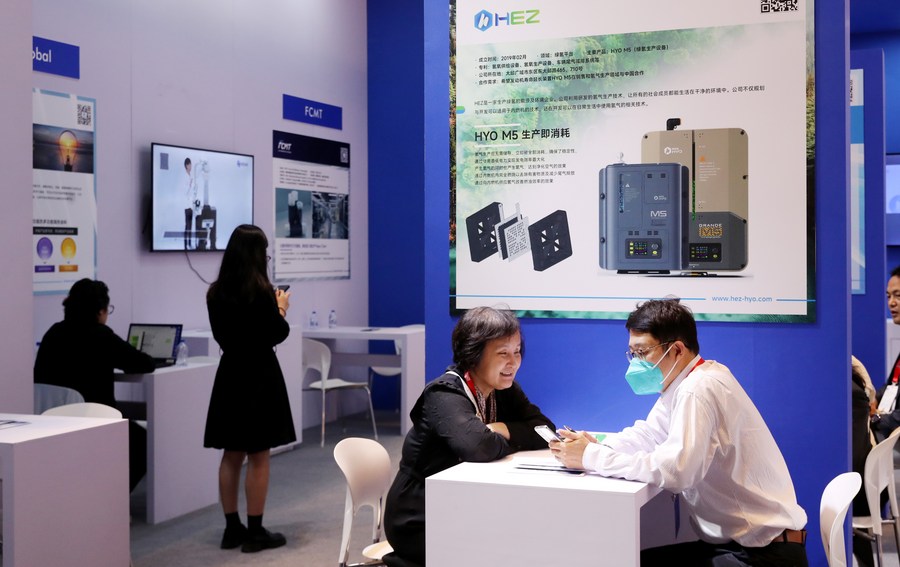Commentary: Tech suppression futile in containing China's innovation progress

A staff member introduces products to a visitor at the InnoMatch Global Tech-Matching Fair of the 2023 Pujiang Innovation Forum in east China's Shanghai Sept. 10, 2023. A global technology matching platform associated to the 2023 Pujiang Innovation Forum in Shanghai has offered 25 billion yuan (about 3.5 billion U.S. dollars) worth of innovation matching projects. (Xinhua/Fang Zhe)
Economic bullying and technological blockades have, in effect, accelerated China's innovation.
BEIJING, Sept. 14 (Xinhua) -- A new Chinese smartphone was launched online as U.S. Commerce Secretary Gina Raimondo visited China at the end of August. Huawei's Mate 60 Pro, testing by Bloomberg News showed, is capable of cellular speeds "on a par with 5G devices like Apple Inc.'s latest iPhones."
Though a gap still remains between China's chip-making capabilities and those of the world's most advanced, China is catching up.
Such a development seems to fulfill warnings from U.S. chipmakers that sanctions wouldn't stop China, but would spur it to redouble efforts in finding alternatives to U.S. technology.
Over the years, Washington has been preventing China's access to cutting-edge technology by hook or by crook. It rolled out a chip act, a thousand-page protectionist document; the groundless accusation of "China stealing intellectual property" was again hyped up; and limiting U.S. investment in China's high-tech sectors was among its latest perilous moves.
If there is any validity in these rule-defying attempts, they only prove that innovation is becoming all the more important in today's world. To China, it is front and center in securing its sustainable development.
Hunkering down, China has been trying hard. Official data show that China's spending on research and development totaled 427.5 billion U.S. dollars in 2022, up 10.4 percent year-on-year, a double-digit growth seen annually since 2016.
The country, currently the largest electric vehicle (EV) market in the world, is embracing an EV boom. The overall exports of China's EVs, lithium and solar batteries, in the first half of the year, climbed by 61.6 percent compared with a year earlier.
Artificial intelligence is also gaining traction. Four Chinese tech firms including Baidu Inc and SenseTime Group just debuted their AI chatbots to the public as the government greenlights AI products to widen their use.
Economic bullying and technological blockades have, in effect, accelerated China's innovation. Up against the critical need for tech self-sufficiency, as the New York Times said in a July article, "if any country can overcome such a challenge, it is likely to be China."
Yet wary of China making further headway, the tentacles of U.S. tech suppression are spreading even wider. Washington has been endeavoring to forge such exclusive cliques as the "CHIP4" and "U.S.-EU Trade and Technology Council," wooing its allies under the guise of "security cooperation."
In the wake of such maneuvers that will spill over and jeopardize global technological cooperation, people's true responses speak for themselves.
South Africa said last month it would not be subject to the pressure of the United States and stop using Huawei's network communication devices.
Amid doubts among U.S. policymakers about the extension of the China-U.S. Agreement on Cooperation in Science and Technology, two Stanford professors sent an open letter to the White House standing up for renewal. Over 1,000 U.S. scientists signed the letter within a week.
In the same vein, China's progress isn't forged behind closed doors. By far it has established technological cooperation with more than 160 countries and regions. Some 200 international organizations and multilateral mechanisms have China as their member.

People attend the Huawei Cloud Summit Saudi Arabia 2023 in Riyadh, Saudi Arabia, on Sept. 4, 2023. The Chinese tech giant Huawei announced on Monday the opening of a cloud data center in Riyadh, as part of its efforts to expand its online service offerings in the Middle East. (Xinhua/Wang Haizhou)
The latest 2023 Nature Index shows that Chinese authors are an important part of natural science research in 2022. For the first time, it ranked top in the share of papers published in high-quality journals, overtaking the United States.
While enhancing its independent R&D capabilities, China allows the world to share in its technological progress. This is a potent testament to its pursuit of globalization and open economy, which, Modern Diplomacy notes, have been the two key factors in human progress over the past few decades.
It is true that China was once the "world factory," but as observers in the West find Huawei's and hence China's progress "better than expected," the country is well on its way to becoming a global hub for open innovation.
As the "world factory" turns into an innovation hub, "the next China is (still) China," said chairman of McKinsey China Joe Ngai.
Photos
Related Stories
Copyright © 2023 People's Daily Online. All Rights Reserved.









